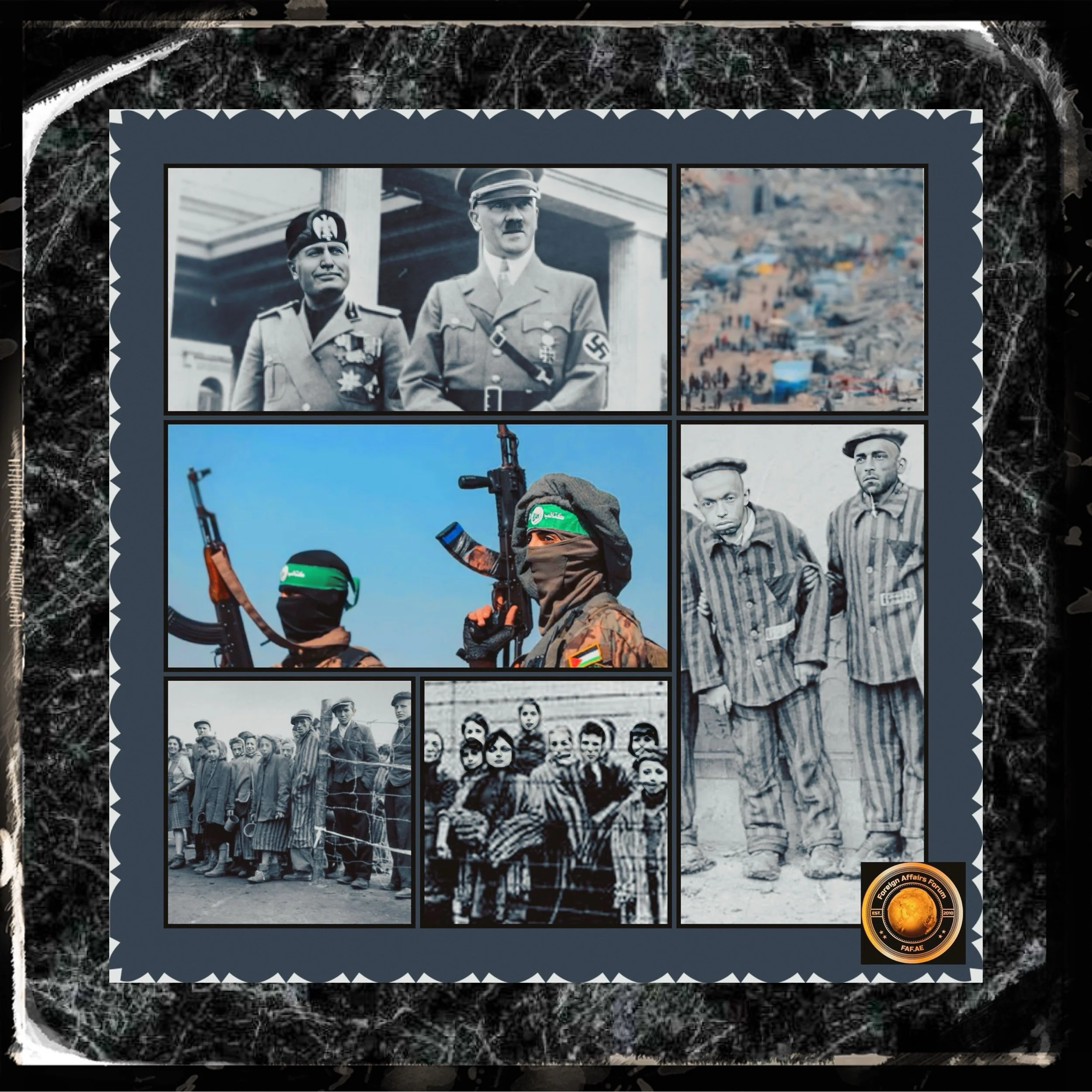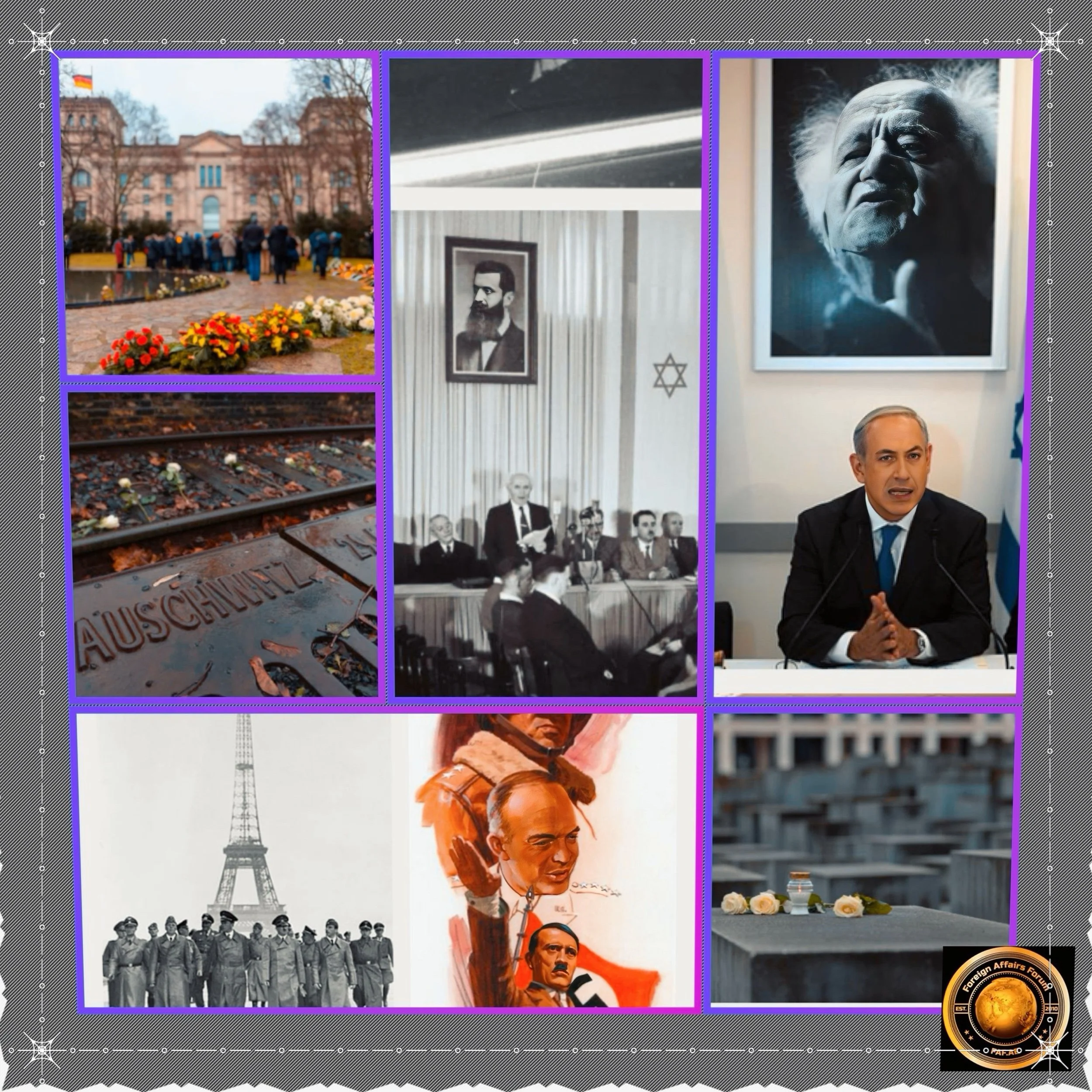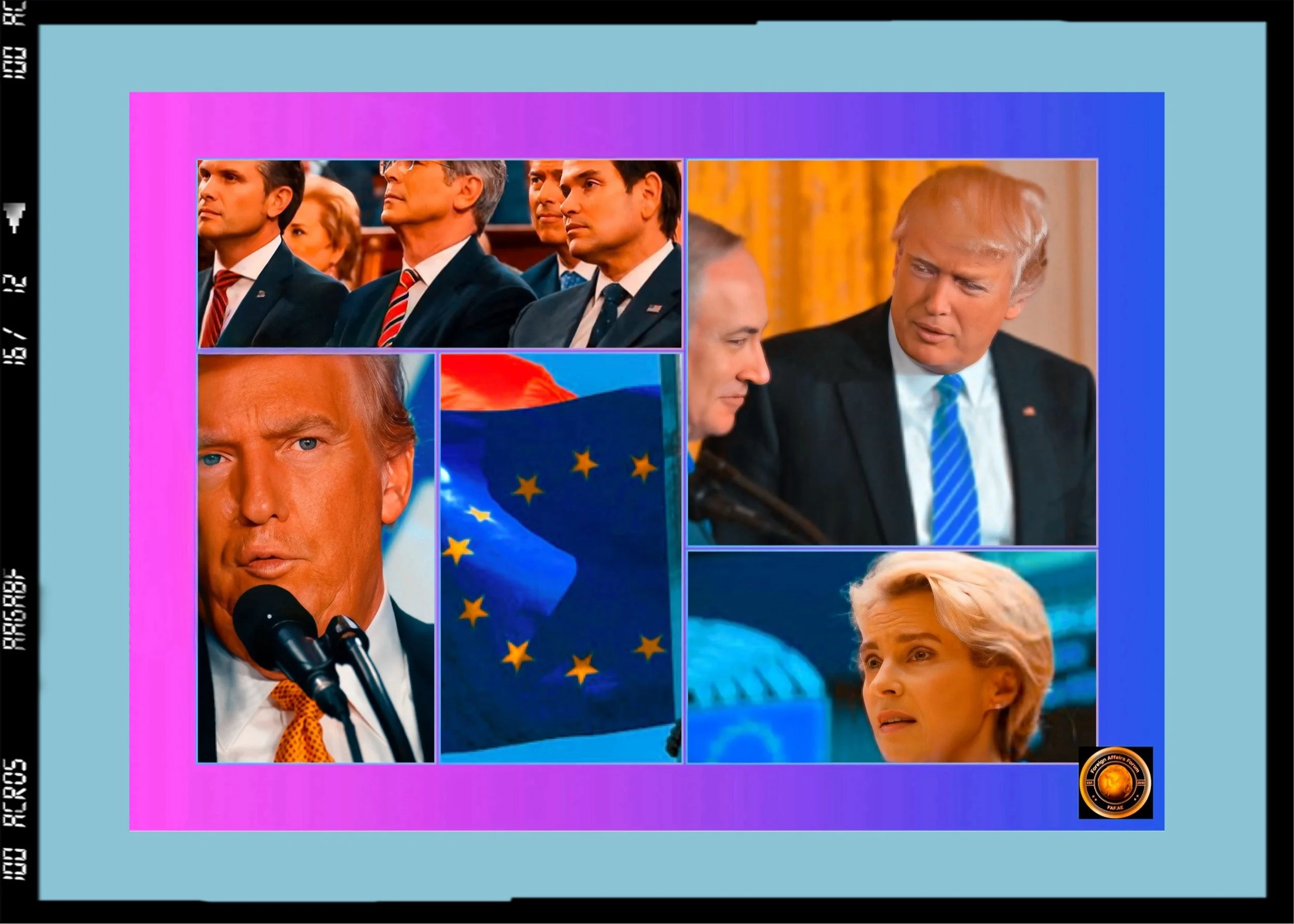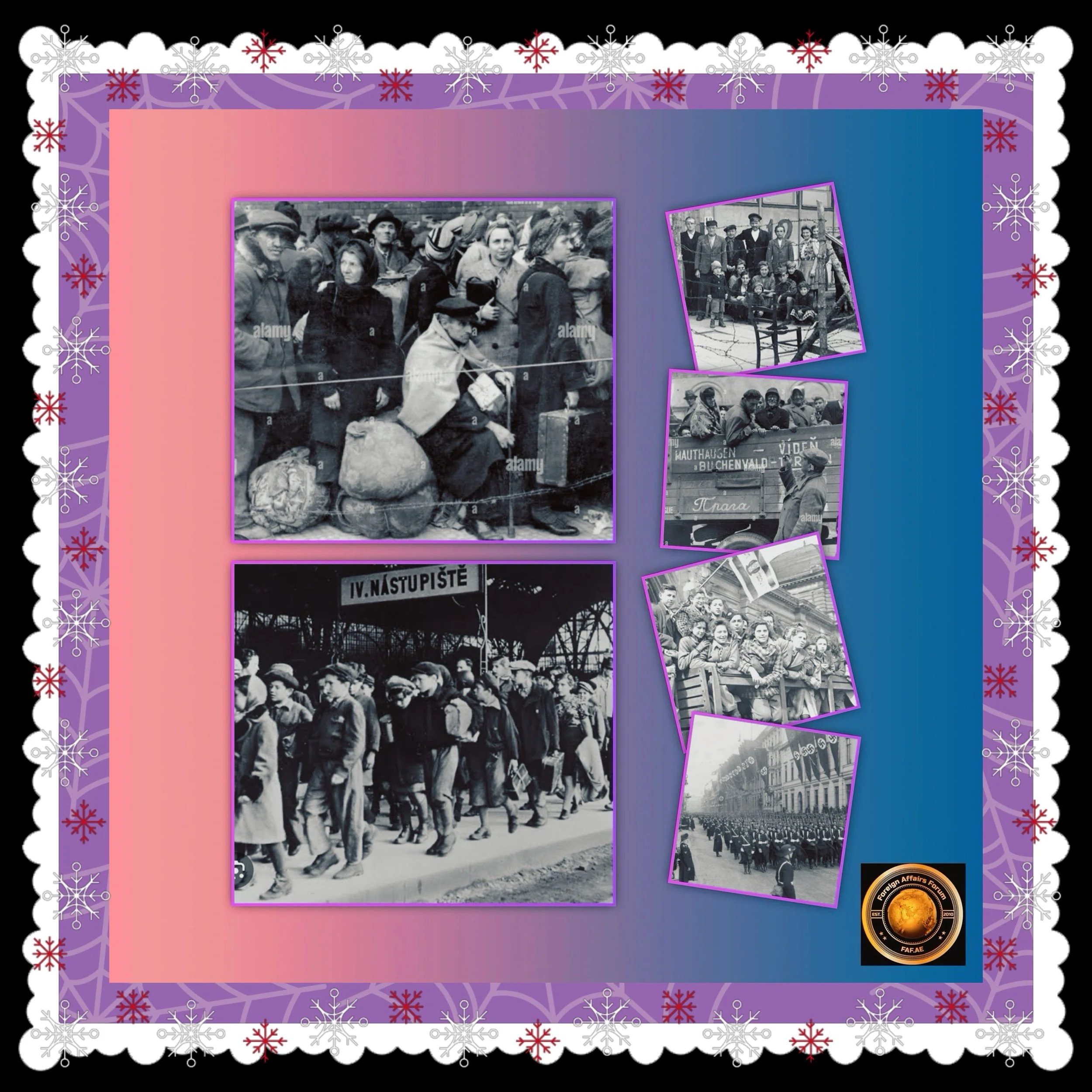The Holocaust’s Aftermath: From Liberation to Political Discourse
Introduction
The liberation of Auschwitz by the Soviet Red Army on January 27, 1945, marked a pivotal moment in revealing the full horrors of the Holocaust to the world, months before World War II officially ended with Japan’s surrender on September 2, 1945.
Today, 80 years later, the Holocaust remains not only a historical tragedy but also a complex element in contemporary political discourse, particularly regarding Israel-Palestine relations.
FAF analysis examines how Holocaust memories have journeyed from revelation to remembrance to rhetorical deployment in global politics.
Holocaust Liberation and Early Media Coverage
When Allied troops advanced through Nazi-occupied territories, they uncovered concentration camps and overwhelming evidence of Nazi atrocities.
At Auschwitz alone, an estimated 1.1 million people were murdered, with approximately 960,000 being Jews.
What Allied soldiers witnessed shocked the global conscience - an industrial-scale apparatus of human slaughter spread across dormitories, gas chambers, crematoria, and mass graves.
Before the camps’ liberation, Western media had largely downplayed reports of Jewish genocide. News of mass killings was often relegated to inside pages of newspapers with minimal space.
As historian David Wyman noted, “The mass media treated the systematic murder of millions of Jews as though it were minor news”. This marginalization of Holocaust news contributed to limited public awareness and pressure for intervention during the genocide itself.
After liberation, however, media coverage drastically changed. According to Wyman, “The American press, which for so long had barely whispered of mass murder and extermination, exploded with news of the German camps”.
Gruesome photographs and detailed coverage appeared consistently for over a month. The world could no longer deny the reality of what had occurred.
Displacement and Aftermath
The war had displaced millions, creating “displaced persons” (DPs) waiting for repatriation. For tens of thousands of Holocaust survivors, options were limited and daunting. Allied occupation forces faced enormous responsibilities: housing and feeding DPs, denazifying Germany, and bringing those responsible for Nazi crimes to justice.
Holocaust Memory and Israel’s Formation
The Holocaust profoundly influenced the establishment of Israel in 1948. While Jewish aspirations for a homeland predated the Holocaust, as historian Dan Diner suggests, Israel’s 1948/49 borders were “legitimized by Auschwitz”.
Political circumstances had previously led to denying Jews statehood in British-controlled Palestine, even as the Nazis enacted the Nuremberg laws in 1935.
The international community’s recognition of a Jewish state came only after the Holocaust’s horrors were fully revealed.
Thus, Israel’s Declaration of Independence specifically referenced the Holocaust as part of its founding narrative. This historical connection between Holocaust suffering and Israel’s establishment remains central to understanding contemporary debates.
Modern Contestations: Holocaust Memory in Political Discourse
Claims of “Holocaust Weaponization”
Critics argue that Holocaust memory has become instrumentalized in discussions about Israel’s policies toward Palestinians.
Some suggest Israel uses historical Jewish victimhood, particularly the Holocaust, to deflect legitimate scrutiny of its current policies.
This criticism intensified during recent conflicts in Gaza, with some activists claiming Israel invokes Holocaust memory to justify military actions against Palestinians.
In January 2025, commemorating the 80th anniversary of Auschwitz’s liberation, about 50 survivors - now in their late 80s and 90s - returned to the site with world leaders including King Charles, Emmanuel Macron, and German President Frank-Walter Steinmeier.
Survivor Tova Friedman, who was two years old when taken to Auschwitz, remarked, “We were victims in a moral vacuum.
But today, however, we have an obligation not only to remember, which is very, very important, but also to warn and to teach that hatred only begets more hatred”.
Accusations of Antisemitism as Political Shield
A significant debate exists around whether accusations of antisemitism are sometimes deployed to silence legitimate criticism of Israeli policies.
Critics contend that supporters of Israel sometimes attempt to stifle criticism by unfairly labeling critics as antisemitic. Some observers argue this pattern intensifies during periods when Israel faces increased international criticism.
For example, political scientists John Mearsheimer and Stephen Walt suggest that accusations of antisemitism leveled at critics of Israel are deliberately timed to defuse the impact of criticisms following aggressive actions by Israel.
The Concept of “Holocaust Inversion”
On the other hand, some scholars identify what they call “Holocaust inversion” - a phenomenon where Israel is equated with Nazi Germany and Palestinians with Holocaust victims.
Scholar Lesley Klaff describes this as involving both an “inversion of reality” (casting Israelis as “new” Nazis) and an “inversion of morality” (presenting the Holocaust as a moral indictment of Jews). This perspective views such comparisons as a perversion of Holocaust memory.
Recent Controversies: Gaza Conflict and Genocide Claims
The ongoing conflict in Gaza has intensified these debates. In December 2024, Amnesty International published a report concluding “Israel has committed and is continuing to commit genocide against Palestinians in the occupied Gaza Strip”. Israel strongly rejects such characterizations.
Israeli Prime Minister Benjamin Netanyahu has frequently labeled critics as antisemitic. After the International Criminal Court sought arrest warrants for Netanyahu, his defense minister, and Hamas officials, Netanyahu accused the ICC prosecutor of being “one of the great antisemites in modern times”.
Critics argue such rhetoric aims to deflect legitimate criticism.
Some Palestinian advocates claim Israel’s references to the Holocaust during the Gaza conflict deliberately frame Palestinians as existential threats to Jews, justifying disproportionate military responses.
According to this perspective, Israeli propaganda attempts to link current events to the Holocaust and other historical tragedies to portray Israel as merely defending itself against threats comparable to historical antisemitism.
Media Representation and Holocaust Memory
The way media around the world has portrayed the Holocaust has evolved significantly over time. A recent book examining Australian press coverage notes how reporting shifted from Hitler’s rise through the extermination campaign to post-war migration of Holocaust survivors to Australia.
FAF highlights how media shapes collective memory of historical events and influences public understanding.
The ethical questions around reporting human suffering remain relevant today.
Media scholars continue debating the responsibilities of journalism when covering genocide and mass atrocities, considering issues of truth, advocacy, and the potential for apathy.
Conclusion
Eighty years after Auschwitz’s liberation, Holocaust memory remains a powerful force in political discourse.
The journey from the camps’ liberation to today reflects complex evolutions in how we understand, memorialize, and sometimes deploy historical trauma in contemporary politics.
What remains undisputed is the historical reality of the Holocaust itself - the systematic murder of six million Jews and millions of others - and the moral imperative to prevent such atrocities.
As survivors age and firsthand witnesses diminish, the responsibility of accurately preserving this history becomes increasingly important.
The debate over how Holocaust memory should inform contemporary politics - particularly regarding Israel-Palestine relations - will likely continue.
The challenge for all parties remains engaging with these difficult questions honestly, acknowledging historical truths while respecting the complexity of current conflicts.
This requires distinguishing between legitimate criticism of policies and antisemitism, between historical comparison and inappropriate exploitation of trauma, and between commemorating victims and instrumentalizing their memory.





